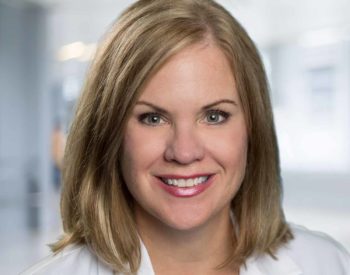SAN ANTONIO (May 26, 2020) — New mothers who have returned to using opioids or have died of an overdose often have a troubled past going back to their childhood. The death of a parent, abuse by a trusted individual, the routine use of drugs in the home or problems with relationships later as an adult are some of the many contributing factors leading to opioid-related deaths in mothers.
The findings are from a new study published recently online in the journal Addiction. The study was conducted by nurse researchers at The University of Texas Health Science Center at San Antonio (UT Health San Antonio).
 “Over the past decade or so, deaths occurring during pregnancy or the year that follows have skyrocketed nationally,” said Lisa Cleveland, Ph.D., APRN, a pediatric nurse practitioner and lead author of the study.
“Over the past decade or so, deaths occurring during pregnancy or the year that follows have skyrocketed nationally,” said Lisa Cleveland, Ph.D., APRN, a pediatric nurse practitioner and lead author of the study.
“Up to this point, little has been known about the context surrounding opioid use or overdose among pregnant or parenting women. We wanted to better understand what contributes to these deaths so we can identify women at risk and develop interventions to prevent these deaths,” she said.
Surveys provided critical information
During the two-year study, the nurse researchers conducted interviews with 99 participants that included women who returned to opioid use — a common contributor to overdose — and the relatives of women who had died as a result of overdose. Data collection occurred during 13 focus groups and 25 individual interviews. The study subjects were in six locations throughout Texas that included rural and urban areas as well as border and coastal communities. Both qualitative and quantitative data were collected for the study.
The interviews included three focus groups composed of a total of 47 women and 27 family members. Twenty-five more women preferred to be interviewed individually
Results were concerning
“What we learned was concerning,” Dr. Cleveland said. “Women reported histories of physical and sexual trauma and loss of a loved one through homicide or suicide. They explained that limited social support, interpersonal conflict and unaddressed mental illness made recovery more challenging. Additionally, losing custody of their children to the child welfare system was described as punitive, resulting in a loss of hope which placed them at greater risk for relapse and overdose,” the authors stated in the study.
Two surveys were also used to collect the data. A sociodemographic questionnaire collected information about participants’ ethnicity, age, marital status, medical and mental health history, and employment status. The Stressful Life Events Screening Questionnaire-Revised, assessed the participants’ lifetime exposure trauma.
New screening tool being developed
The study identified several risk factors for overdose death that included stress, lack of social support, interpersonal conflict and unidentified or untreated mental illness. While some women did not openly discuss a will to die, some said death was an option to escape their situations. “A unique finding of our study is the role substances played in ‘escaping’ adverse conditions and emotions,” Dr. Cleveland said. The research team is now using its findings to develop and analyze a brief screening instrument that will help identify women at risk so that they may be referred to lifesaving interventions.
The authors recommended that all people who serve vulnerable mothers receive specialized training on maternal substance use disorder and the family. They noted in the study and that resources already are available through the Substance Abuse & Mental Health Services Administration, MOMS Ohio and the Texas Mommies Program.
# # #
The University of Texas Health Science Center at San Antonio, dba UT Health San Antonio, is one of the country’s leading health sciences universities and is designated as a Hispanic-Serving Institution by the U.S. Department of Education. With missions of teaching, research, patient care and community engagement, its schools of medicine, nursing, dentistry, health professions and graduate biomedical sciences have graduated more than 37,000 alumni who are leading change, advancing their fields and renewing hope for patients and their families throughout South Texas and the world. To learn about the many ways “We make lives better®,” visit www.uthscsa.edu.
Stay connected with The University of Texas Health Science Center at San Antonio on Facebook, Twitter, LinkedIn, Instagram and YouTube.

